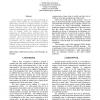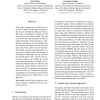415 search results - page 11 / 83 » Individual learning of coordination knowledge |
HICSS
2006
IEEE
14 years 1 months ago
2006
IEEE
Knowledge is considered to be a key organizational resource in the 21st century and the knowledge management ‘movement’ has alerted organizations to the fact that they should ...
JKM
2006
13 years 7 months ago
2006
Purpose Knowledge management for space exploration is part of a multi-generational effort. Each mission builds on knowledge from prior missions, and learning is the first step in ...
IEEEICCI
2002
IEEE
14 years 13 days ago
2002
IEEE
In this contribution we present a theoretical approach which has been utilized to inform the coordination of the development of complex systems. Coordination is regarded as a form...
ICRA
2003
IEEE
14 years 23 days ago
2003
IEEE
We present an approach that uses Q-learning on individual robotic agents, for coordinating a missiontasked team of robots in a complex scenario. To reduce the size of the state sp...
EUSFLAT
2003
13 years 9 months ago
2003
This paper suggests an evolutionary approach to design coordination strategies, a key issue in distributed intelligent systems. We focus on competitive strategies in the form of f...


